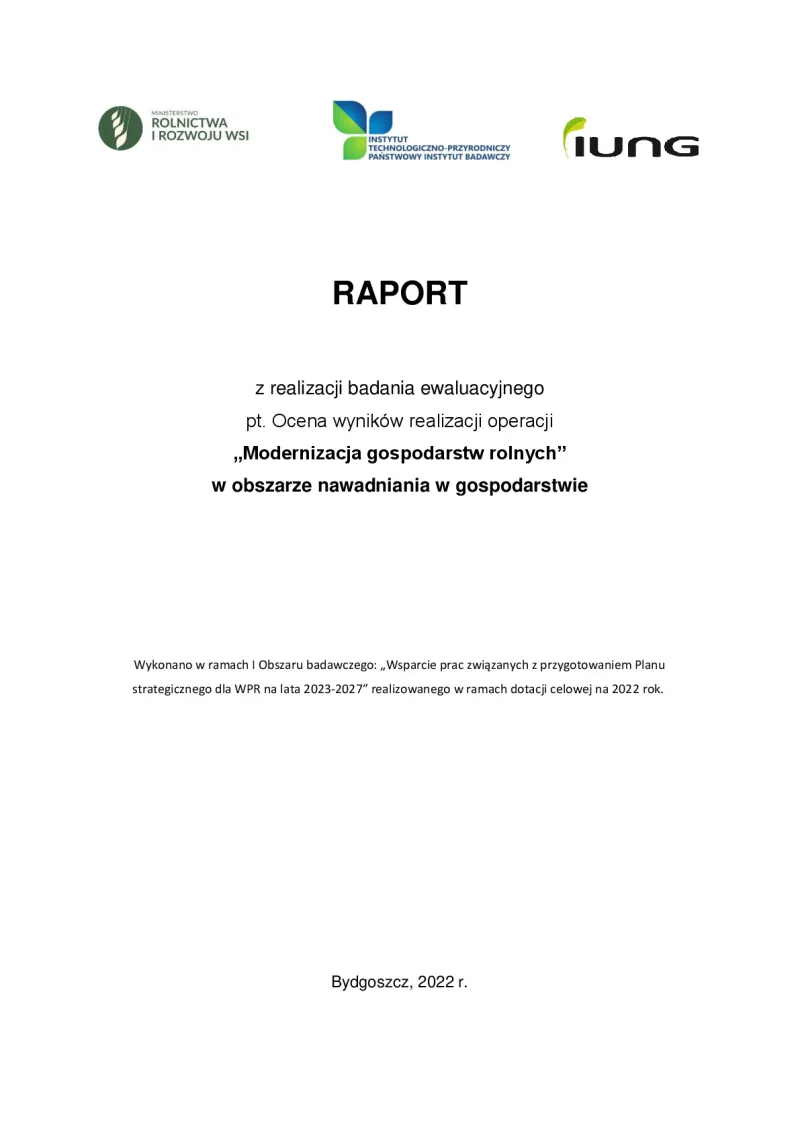Evaluation of farm modernisation results on irrigation
The evaluation focuses on high level reasons for rejections to grant funds under a programme for farm irrigation.
- Poland
- 2014-2022
- Environmental impacts


The report evaluates the programme 'Modernisation of farms in the area of on-farm irrigation', included in sub-action 4.1 (support for investments in agricultural farms), covered by the 2014–2020 Rural Development Programme (RDP).
It was commissioned by the Polish Ministry of Agriculture and Rural Development and covers the evaluation period of 2019-2022.
The assessment was related to Specific Objective 5 (foster sustainable development and efficient management of natural resources such as water, soil and air, including by reducing chemical dependency) and RDP Priority 5 (resource efficiency, low carbon and climate resilient economy).
It covered the whole country, specifically focusing on one voivodship (NUTS2) – kujawsko-pomorskie (north-centre).
The main objective was to identify the reasons for the small number of granted contracts from applications to four irrigation funding calls.
The main evaluation criterion was the effectiveness of the application process. The methodology includes a combination of qualitative and quantitative methods.
Qualitative methods are desk research using documents related to the programme and content analysis of survey data from beneficiaries and Paying Agency staff.
Quantitative methods were an analysis of secondary monitoring data from the Paying Agency and survey data from a sample of applicants, beneficiaries and Paying Agency staff, using descriptive statistics (percentages) and visuals. The main evaluation element was evaluation questions.
Of all applications submitted in the country, 81% (1 809) were rejected.
The main reasons for rejecting applications are the applicant's resignation, refusal to grant aid and refusal at the pre-selection stage. The reason for the resignation of the applicants is mainly due to the impossibility of collecting and delivering the required documentation, including geological, environmental, water supply and water rights permits, in a relatively short time. The document circulation procedure was also lengthy.
Concerning the reference to and interpretation of the provisions of the appropriate regulation, the main reasons for the applicants' rejection were: (i) failure to provide necessary documents; (ii) failure to provide the address of the applicant or the written resignation of the applicant; (iii) failure to complete the application despite a repeated request from the Paying Agency; and (iv) failure to meet the conditions/requirements for granting aid due to a pandemic. Most rejected applications related to reason (iv) and the COVID-19 pandemic.
Among the planned investments, based on 364 concluded aid agreements, most agreements concern the purchase of new machines and equipment to support water management.
According to many farmers, the difficulty regarding the whole procedure of applying for funding is too high in relation to the funds that could be obtained. There are opinions that the procedures were not clearly designed for the average farmer and that the language of the documents is too complex. There is also a problem with a long time for issuing decisions.
The most important recommendations of this evaluation include:
- Simplification of procedures.
- Carrying out educational and information-promotional activities.
- Giving more attention to water saving in the next calls; assigning additional points to those applicants who declare the use of various modern techniques of irrigation support and water saving.
- A comprehensive and coherent water resources management policy taking into account the needs of different consumers, including rural populations, especially on a local scale (involving a series of recommendations and requirements both on a macro level (i.e. the State) and on a micro level (i.e. individual farmers)).
- Greater attention to the availability and quality of data for decision-making and creating spaces for discussion of different actions.
Author(s)
The Institute of Technology and Natural Sciences (Instytut Technologiczno-Przyrodniczy – PIB), and the Institute of Soil Science and Plant Cultivation (Instytut Uprawy, Nawożenia i Gleboznawstwa – PIB)
Resources
Documents
From the implementation of the evaluation study titled: Assessment of the results of the operation 'Modernization of agricultural holdings' in the area of on-farm irrigation.
(PDF – 5.06 MB – 129 pages)
Appendix No. 6 to the expertise: Assessment of the results of the operation 'Modernization of agricultural holdings' in the area of on-farm irrigation.
(PDF – 2.16 MB – 40 pages)